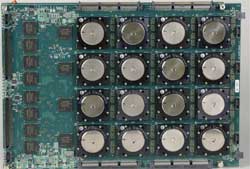
The so-called "neurosynaptic" chip is a breakthrough that opens a wide range of computing possibilities from self-driving cars to artificial intelligence systems that can installed on a smartphone, the scientists say.
The researchers from IBM, Cornell Tech and collaborators from around the world said they took an entirely new approach in design compared with previous computer architecture, moving toward a system called "cognitive computing."
"We have taken inspiration from the cerebral cortex to design this chip," said IBM Chief Scientist for Brain-Inspired Computing, Dharmendra Modha, referring to the command centre of the brain.
He said existing computers trace their lineage back to machines from the 1940s which are essentially "sequential number-crunching calculators" that perform mathematical or "left brain" tasks but little else.
"The new chip dubbed "TrueNorth" works to mimic the "right brain" functions of sensory processing - responding to sights, smells and information from the environment to "learn" to respond in different situations," Modha said.
It accomplishes this by using a huge network of "neurons" and "synapses," similar to how the human brain functions by using information gathered from the body's sensory organs.

The researchers designed TrueNorth with 1m programmable neurons and 256m programmable synapses, on a chip with 4,096 cores and 5.4bn transistors.
A key to the performance is the extremely low energy use on the new chip, which runs on the equivalent energy of a hearing-aid battery.
This can allow a chip installed in a car or smartphone to perform super-computer calculations in real time without connecting to the cloud or other networks.
"The sensor becomes the computer," Modha told AFP in a phone interview. "You could have better sensory processors without the connection to Wi-Fi or the cloud.
This would allow a self-driving vehicle, for example, to detect problems and deal with them even if its data connection is broken.
"It can see an accident about to happen," Modha said.
Similarly, a mobile phone can take smells or visual information and interpret them in real time, without the need for a network connection.
"After years of collaboration with IBM, we are now a step closer to building a computer similar to our brain," said Rajit Manohar, a researcher at Cornell Tech, a graduate school of Cornell University.

The project funded by the US Defence Advanced Research Projects Agency (DARPA) published its research in a cover article on the journal Science.
The researchers say TrueNorth in some ways outperforms today's super-computers although a direct comparison is not possible because they operate differently.
But they wrote that TrueNorth can deliver from 46bn to 400bn "synaptic" calculations per second per watt of energy. That compares with the most energy-efficient super-computer which delivers 4.5bn "floating point" calculations per second and per watt.
The chip was fabricated using Samsung's 28-nanometer process technology.
"It is an astonishing achievement to leverage a process traditionally used for commercially available, low-power mobile devices to deliver a chip that emulates the human brain by processing extreme amounts of sensory information with very little power," said Shawn Han of Samsung Electronics.
"This is a huge architectural breakthrough that is essential as the industry moves toward the next-generation cloud and big-data processing," Han said.
Modha said the researchers have produced only the chip and that it could be years before commercial applications become available.
But he said it has the potential to transform society with a new generation of computing technology. And he noted that hybrid computers may be able to one day combine the "left brain" machines with the new "right brain" devices for even better performance.
Source: AFP Via I-Net Bridge

For more than two decades, I-Net Bridge has been one of South Africa’s preferred electronic providers of innovative solutions, data of the highest calibre, reliable platforms and excellent supporting systems. Our products include workstations, web applications and data feeds packaged with in-depth news and powerful analytical tools empowering clients to make meaningful decisions.
We pride ourselves on our wide variety of in-house skills, encompassing multiple platforms and applications. These skills enable us to not only function as a first class facility, but also design, implement and support all our client needs at a level that confirms I-Net Bridge a leader in its field.
Go to: http://www.inet.co.za